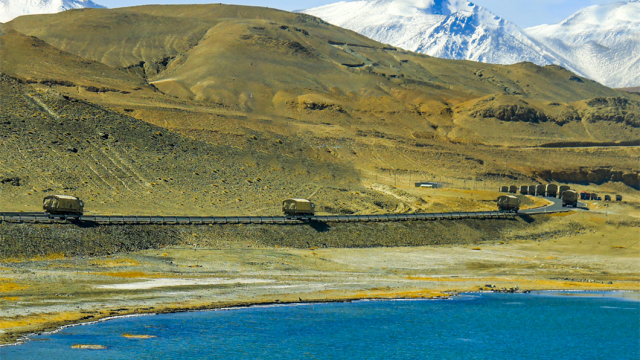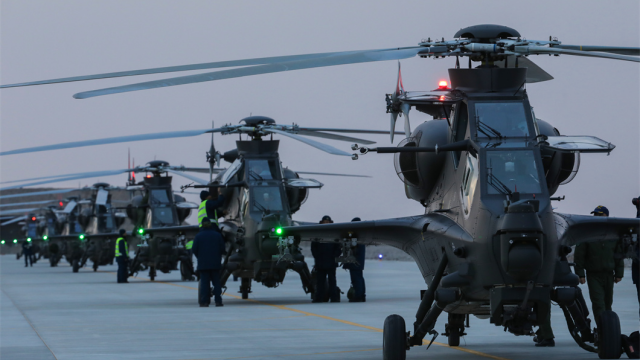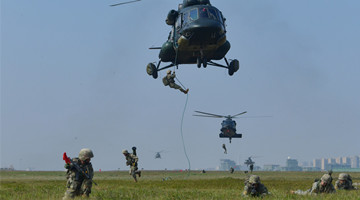DAMASCUS, April 30 (Xinhua) -- As many as 26 pro-government fighters, mostly Iranians, were killed in the overnight missile attack that targeted Syrian military sites in northern Syria, a monitor group reported Monday.
The Syrian official media outlets have yet to disclose who was behind the missile strike that targeted military bases in the countrysides of Hama and Aleppo provinces on Sunday evening.
The opposition monitor group, Syrian Observatory for Human Rights, held Israel responsible for the attack, adding that surface-to-surface missiles hit the Regiment 47 base that houses Syrian government and allied Iranian forces in the countryside of Hama province.
The Britain-based watchdog group, which monitors the Syrian war, added that missiles also hit positions near the Nayrab air base in Aleppo province.
Meanwhile, the explosions that followed the attack on the Hama military base was big as the European-Mediterranean Seismological Centre (EMSC) recorded a 2.6-magnitude earthquake in the area following the explosions that resulted from the attack, which hit weapons depots.
Israel has repeatedly targeted Syrian military positions, where Iranian fighters or positions are located, with its officials stressing they will not tolerate any military presence of Iran in Syria.
Earlier in April, Israel carried out a missile strike on the T-4 air base in the countryside of the central province of Homs, killing Syrian soldiers and allied Iranian fighters.
Days later, specifically on April 14, the United States, Britain and France launched a series of missile strikes on Syrian military positions in retaliation for an alleged toxic gas attack on the former rebel-held area east of Damascus.
The overnight missile strikes come at a time, when the Syrian government reached deals with an array of rebel groups south of Damascus to evacuate to rebel-held areas in the northwestern province of Idlib.
The first stage of the deals is being prepared, Syrian state TV said on Monday, airing some footages of bulldozers removing rubble from the entrances of Yarmouk Camp area south of Damascus as a prelude for the evacuation process.
The deals include the towns of Yalda, Babila and Beit Sahem south of Damascus, and it will see the evacuation of rebels and their families toward rebel-held areas in Idlib.
The evacuation will be for rebels who refuse to reconcile with the government, while the militants who want to remain in the three towns will have to reconcile with the government and hand over their weapons.
The evacuees will only be allowed to have light weapons, said the report, adding that the Syrian government's institutions will return to the three towns after the process is completed.
Another deal was declared later on Sunday, after the deals in Yalda, Babila and Beit Sahem, which will see rebel evacuating Yarmouk Camp, amid reports that IS militants, who control 75 percent of Yarmouk area, are not included.
According to the deal, the rebels in the area will also depart for the rebel-held areas in Idlib, and in return, the rebels in Idlib will break a siege imposed for years on the pro-government towns of Kafraya and Foa in Idlib's countryside.
About 1,500 rebels, out of a total of 5,000, from Kafraya and Foa will evacuate as the first stage of the deal, the report said, as the state TV said buses started preparing to enter Kafraya and Foa for the evacuation of the pro-government civilians.
Under the deal, the rebels will release 85 kidnapped people from the town of Eshtabraq in Idlib.
Meanwhile, the Syrian warplanes intensified their strikes on the IS positions in Hajar al-Aswad and Yarmouk on Monday as preparations were underway for the evacuation of rebels, who are not allied with IS.
The camp houses a large population of Palestinian refugees in Syria, but it has been inhabited by both Palestinians and Syrians.
In 2015, IS took over large areas of the camp. The rest of the area is believed to be controlled by the al-Qaida-linked Nusra Front and allied militants.
The defeat of IS, and the evacuation of rebels from areas south of Damascus would mark the end of battles in the capital and its countryside after the Syrian forces made major progress in April in terms of the evacuation of rebels and their families from the Eastern Ghouta countryside of Damascus and the eastern part of the mountainous Qalamoun region in the northern countryside of Damascus.
The recapture of Eastern Ghouta alone was considered to be the major victory as that area was an active battle zone that posed a major threat to Damascus with daily mortar attacks on the city and the frequent infiltration attempts of the rebels that had all been thwarted by the army.
The state TV has been airing interviews with local analysts who say a new aggression is carried out against Syria every time the Syrian army scores progress on the ground, especially now that it is closing in on IS in the Hajar al-Aswad and Yarmouk Camp.









